Pennsylvania’s fracking boom is hurting its oldest residents, “Up until 10 years ago, I was a pretty healthy bitch. And, unfortunately, I’m dying.” by Scott Cannon and Kate Raphael, Nov 06, 2023, Grist
In 1976, Mary Ellen McConnell, a “concrete city kid,” moved from Bethesda, Maryland, to the verdant hills and river valleys of Clearville, Pennsylvania. She fell in love with rural life and settled on a 124-acre farm on the Marcellus Shale, a vast geological formation that stretches from New York to West Virginia and blankets Pennsylvania.
But that tranquility proved to be short-lived: A few decades later, the area would be overrun with big fracking rigs from natural gas companies drawn to the rich stores of methane gas trapped in the 500 million-year-old sedimentary rock below.
The previous owners of McConnell’s home had signed a lease in perpetuity with Columbia Gas, a subsidiary of a major natural gas company. That meant that even though McConnell owned the farmhouse, she had no say in how the minerals below the surface were used. In return, she received an annual check of $248, or $2 per acre.
McConnell spent years trying to cancel the lease, petitioning the company directly and even seeking legal counsel, but in 2010, Columbia Gas filed an injunction against McConnell and began seismic testing to use the area beneath her land for “storage” — of exactly what, McConnell does not know.
Over the next few years after the injunction, she and her family experienced a barrage of severe health problems. McConnell developed breathing trouble, severe leg pain, and high blood pressure. She had two massive heart attacks. A 2012 test conducted by a private company, Martin Water Conditioning, revealed that her water contained more than twice the safe concentration of arsenic. A media representative from TC Energy, the parent company of Columbia Gas, said in an email that the reservoir formations beneath McConnell’s property are used to temporarily store natural gas beneath one mile of rock.
“Up until 10 years ago, I was a pretty healthy bitch,” said McConnell, now 80. “And, unfortunately, I’m dying.”
The fracking process, the primary method of gas extraction in Pennsylvania, involves drilling vertically then horizontally into the earth and injecting pressurized water, sand, and chemicals into the ground to fracture the shale and force naturally stored methane out. It uses over a thousand different chemicals and pollutants, some of which are considered proprietary trade secrets, meaning nearby residents don’t always know what they’re exposed to.
Of the nearly 18 million Americans living near oil and gas wells, close to 3 million are 65 and older, many concentrated in Pennsylvania, the country’s second biggest producer of methane gas behind Texas, according to the U.S. Energy Information Administration.
Living in an environmentally polluted area is dangerous for anyone, but for older adults like McConnell, exposure over many years has the potential for devastating, even life-ending, health problems. Compared to younger people, seniors are less able to excrete harmful substances, like arsenic and other heavy metals, as the liver and kidneys filter out toxins less effectively with age. And seniors are also more likely to have pre-existing conditions such as respiratory and cardiovascular problems that can amplify health risks.
In Pennsylvania, many older adults have been living in the shale field since fracking began in the early 2000s, meaning they have experienced decades of chronic, cumulative exposure to polluted air, water, and soil. Some don’t have the financial resources to move, let alone the mobility or community support to settle elsewhere.
“We say ‘the dose makes the poison’ in public health,” said Joan Casey, an environmental epidemiologist at the University of Washington. “So more exposure over a longer period of time is likely to be related to worse health outcomes.”
Dr. Ned Ketyer, a retired Pennsylvania physician and president of the state’s chapter of Physicians for Social Responsibility, has talked to many seniors suffering from a range of health problems they think are related to fracking. People living near oil and gas development report breathing problems, nosebleeds, rashes, cancer, high blood pressure, heart problems, dizziness, depression, and anxiety, according to a Physicians for Social Responsibility report Ketyer helped review.
“I’m convinced that, at the very least, exposure to this type of pollution contributes to the illnesses,” he said.
In recent years, studies published by researchers at Harvard and the University of Chicago have shown that the risk of death and hospitalization for cardiovascular events increases for older adults who live near oil and gas wells.
Still, there remains a large gap in our understanding of how oil and gas development affects older adults’ health. Much of the research has focused on pediatric and perinatal health outcomes, which are easier to study in a shorter time period, while chronic diseases in older adults may take years to emerge.
Indeed, because the risk of chronic diseases, especially cardiovascular and respiratory conditions and cancers, increases with age, seniors are particularly vulnerable, said Rachel Morello-Frosch, a professor of environmental health sciences at the University of California, Berkeley, and Grist board member.
“If you add environmental exposure to that, that can amplify your risk of having those disease outcomes or worsening your conditions,” Morello-Frosch said.
Ray Kemble, a 68-year-old resident of Dimock, a town in northeast Pennsylvania, invested everything he had in his property, a five-bedroom home on a seven-acre lot. In 2006, he signed a gas lease with Cabot Oil and Gas, now Coterra. But he says he hasn’t gotten rich, only receiving about $5,000 in total.
“I’ve worked every day in my daggone life,” said Kemble. “I never expected this shit to happen.”
Kemble is far from a standout case. Many Pennsylvanians who were exposed to fracking waste didn’t benefit financially from fracking, according to a 2022 study published by a team of researchers including Casey, Morello-Frosch, and UC Berkeley environmental scientist David González.
One reason for that is that the people living on the land being fracked aren’t always entitled to royalties from extraction. In Pennsylvania, estates can be split, meaning one person can own what sits above ground — say, a house or farm — and someone else can own all the minerals that lie under the surface. In a split estate, the person who gets paid for leasing the minerals to a gas company may not live on the land where the fracking occurs. The authors of the study found that in poorer communities, the owners of mineral rights were less likely to live where extraction occurred, while those living on the land were more likely to be exposed to high volumes of fracking waste.
Even when residents do sign gas leases and earn royalties from fracking, they often don’t reap the big economic benefits they anticipated, Morello-Frosch said. And they’re left dealing with a host of unanticipated consequences, like poisoned air and water.
In 2009, Kemble’s well became contaminated by the gas industry and he had to start hauling water from a neighboring town. Since then, he says his health has deteriorated dramatically. He experiences breathing problems and has lost all but five teeth after the others began rotting and falling out of his mouth. In the span of a year and half, he has undergone seven cancer surgeries.
Last winter, Kemble traveled to Philadelphia for several doctors’ appointments. Immediately, his breathing improved, he said. But within 24 hours of returning to Dimock, he once again had trouble breathing.
Kemble doesn’t think his health problems can be attributed to the wells alone: He worked for the gas industry for three years and believes the job may also have exposed him to harmful chemicals. “This industry is basically killing us,” he said.
Kemble’s neighbor Rebecca Roter had a similar experience. After signing a gas lease, she noticed her water smelled like an “organic chemistry lab.” Testing by a private company hired by the gas company revealed contamination from volatile organic compounds, which are produced during the fracking process and are linked to health problems including eye, ear, and throat irritation, headaches, kidney and liver damage, and cancer. Roter said she developed skin rashes, sinus and ear infections, mouth ulcers, and swollen lymph nodes.
Like Kemble, she had to find replacement water for herself, her dogs, and her late father, who was living with her at the time. Every week, Roter would fill up 20 five-gallon jugs at a friend’s house, no matter the weather. She found the situation untenable. When she trudged through snow and ice to retrieve the water, she would sing to herself the Rolling Stones’ “You Gotta Move.”
And eventually, she did. In 2015, Roter sold her mineral rights to the gas company, giving them the ability to extract gas from the land beneath the property without having to pay her royalties. Rather than the series of small payments over time she had received under the lease agreement, the sale generated a large lump sum — enough money for her to relocate to Georgia.
Now 62, Roter calls herself a “Pennsylvania shale gas refugee.” Since leaving, she says her health has gotten much better.
The water situation in Dimock, however, has improved only marginally since Roter left. As part of a 2022 plea agreement, Coterra Energy Inc.![]() previously Cabot; companies that frac and poison us, frequently change their names to make it easier to keep poisoning and harming communities
previously Cabot; companies that frac and poison us, frequently change their names to make it easier to keep poisoning and harming communities![]() , the corporate successor of the company responsible for the initial water contamination in Dimock, now delivers jugs of water weekly to affected homes. The service will continue until a new water line is constructed by 2027. George Stark, a Coterra employee, told Grist that the company has completed payment for the water line
, the corporate successor of the company responsible for the initial water contamination in Dimock, now delivers jugs of water weekly to affected homes. The service will continue until a new water line is constructed by 2027. George Stark, a Coterra employee, told Grist that the company has completed payment for the water line ![]() I do not believe him
I do not believe him![]() and that Pennsylvania American Water will be responsible for its construction.
and that Pennsylvania American Water will be responsible for its construction.
But Kemble still fears he won’t be able to sell his home for anything close to what he paid for it. He has all but abandoned the country lifestyle that drew him to Dimock. He has a swimming pool in the backyard but doesn’t have safe water to fill it. He stopped growing vegetables because he thinks the soil is poisoned. Kemble doesn’t hunt anymore because he worries the animals themselves are contaminated. But he remains stuck in place.
“When all your money’s tied up right here, you’re kind of screwed.”
For older adults like Kemble who can’t afford to leave the land they fear is poisoning them, many say there are not enough official resources to help. Area agencies on aging typically do not offer specific support to seniors affected by gas development. Instead, they often recommend older residents file complaints with the Pennsylvania Department of Environmental Protection, or DEP.![]() Pfffft, an agency as useless as AER. They help the frac’ers, not the frac’d
Pfffft, an agency as useless as AER. They help the frac’ers, not the frac’d![]()
The DEP responds by testing for 26 possible contaminants. If officials determine there is a need to test for additional pollutants, they may expand the list — but it can be difficult to pinpoint what to look for. Although well operators are required to disclose all the compounds used in the fracking process to the department, companies may still designate some compounds as proprietary, said Colleen Connolly, a DEP communications manager.
Organizations such as the Environmental Health Project and Reducing Outdoor Contaminants in Indoor Spaces work to educate Pennsylvanians about the hazards of living close to gas development. The latter offers instructions for constructing at-home air-filtration systems and leads a low-cost monitoring program that allows Pennsylvanians to measure the level of particulate matter — tiny airborne substances, both solid and liquid — in their homes.
But González, the UC Berkeley epidemiologist who was part of a team that examined strategies to protect people from oil and gas development, said that isn’t enough. He and other researchers concluded that eliminating the hazard — banning new wells and phasing out existing fossil fuel development — was the best way to protect people’s health. The least effective ways were providing residents with mitigation tools, like air and water filters, and asking them to wear personal protective equipment.
Scant resources exist specifically for affected seniors, many of whom are low-income.![]() Of course not, much public money goes to frac’ers – frac’ing is an uneconomical con that runs on lies, deception and ripping off banks, investors, lease holders and communities. Frac’ers need to steal from the commons to finance their unrelenting greed and abusive operations. Alberta’s petroleum soaked gov’t, the UCP, led by crude, ignorant, evangelical extremist Take Back Alberta (deeper into the cave), keeps giving more and more $billions of public money to petroleum industry polluters and now seems intent on also stealing the Canada Pensions of half of Canadians (even those that do not live in Alberta and never have) to give to bankrupting frac’ers, oil, gas, and bitumen companies. Companies see the financial crumbling on the wall they’ve created. Stealing from ordinary citizens is their way to keep frac’ing. Industry and its enablers, including our lying courts, too many lying lawyers, politicians and regulators, want it all, and intend to leave nothing for the rest of us, certainly nothing for those of us that got frac’d – not even safe air, land, or water, and not even sufficient water needed to fight ever worsening and wilder wild fires caused by fossil fuel pollution induced climate change.
Of course not, much public money goes to frac’ers – frac’ing is an uneconomical con that runs on lies, deception and ripping off banks, investors, lease holders and communities. Frac’ers need to steal from the commons to finance their unrelenting greed and abusive operations. Alberta’s petroleum soaked gov’t, the UCP, led by crude, ignorant, evangelical extremist Take Back Alberta (deeper into the cave), keeps giving more and more $billions of public money to petroleum industry polluters and now seems intent on also stealing the Canada Pensions of half of Canadians (even those that do not live in Alberta and never have) to give to bankrupting frac’ers, oil, gas, and bitumen companies. Companies see the financial crumbling on the wall they’ve created. Stealing from ordinary citizens is their way to keep frac’ing. Industry and its enablers, including our lying courts, too many lying lawyers, politicians and regulators, want it all, and intend to leave nothing for the rest of us, certainly nothing for those of us that got frac’d – not even safe air, land, or water, and not even sufficient water needed to fight ever worsening and wilder wild fires caused by fossil fuel pollution induced climate change.![]()
Even for older Pennsylvanians who have not developed serious health problems since gas development began, bearing witness to the destruction of the forested countryside elicits tremendous grief and stress.
Barbara Jarmoska, a 75-year-old resident of Lycoming County in central Pennsylvania, nicknamed the “bull’s-eye of the Marcellus Shale,” has a lifetime of memories on her land. She grew up taking baths in the nearby creek, as the house had no indoor plumbing. She would fall asleep to the croak of bullfrogs and walk through the woods in search of box turtles.
As the gas industry has fracked the area, Jarmoska has watched the box turtles disappear, the cacophony of bullfrogs replaced by the din of drill bits and 18-wheelers. Now, the landscape she loved is preserved only in her memory.
“It changes your sense of place and safety,” Jarmoska said. She has started taking medication for high blood pressure, which she suspects is related to the “relentless stress” of living near gas development, “both seeing the consequences and fearing the unknown.”
Back in Clearville, McConnell says she received an appraisal of “no value” on her property — which she attributes to the nearby fracking. Even if she were able to sell her land, she has limited mobility and would be leaving behind neighbors on whose friendship and support she has relied.
Still, there’s a part of her that cannot bear the thought of moving anywhere else. McConnell has buried her loved ones, including her son, who died from cancer at age 50, on her farm.
“The farm was bought for me, and that is where I intend to stay,” she said. “Everything I love is right here. It’s dead, but I love it.”
*This story has been corrected to reflect the location to which Ray Kemble traveled for doctors’ appointments. It has also been updated to clarify the form in which Coterra delivers water to Dimock.
Kate Raphael is a writer with the Investigative Reporting Program at the University of California, Berkeley, Graduate School of Journalism. She reported this story through a grant from The SCAN Foundation.

Refer also to:
2023: EU criminalises environmental damage ‘comparable to ecocide’, Directive punishes most serious cases of environmental damage, including habitat loss and illegal logging![]() Instead of tossing corporate criminals in prison, fining them, and or ordering them to fully repair and make whole the many harms repeatedly done, Canada honours them with awards like the Emerald Awards and gives them the Order of Canada (e.g. Gwyn Morgan, Encana CEO after the company illegally frac’d and contaminated community drinking water supplies).
Instead of tossing corporate criminals in prison, fining them, and or ordering them to fully repair and make whole the many harms repeatedly done, Canada honours them with awards like the Emerald Awards and gives them the Order of Canada (e.g. Gwyn Morgan, Encana CEO after the company illegally frac’d and contaminated community drinking water supplies).![]()
… Marie Toussaint, a French lawyer and MEP heading EU efforts to criminalise ecocide, said the decision “marks the end of impunity for environmental criminals” and could usher in a new age of environmental litigation in Europe. …
Although the agreed text does not itself include the word “ecocide”, its preamble says it intends to criminalise “cases comparable to ecocide”.
These are actions that cause widespread, substantial and irreversible or long-lasting damage to large or important ecosystems, habitats or the quality of air, soil or water.
… Having a permit to carry out listed activities will not automatically be an excuse. …
The law introduces new penalties, ranging from prison sentences for individuals to exclusion from access to public funds for companies.
… “Our health depends on the state of the environment in which we live, so we must deter criminals willing to destroy ecosystems for profit.” …
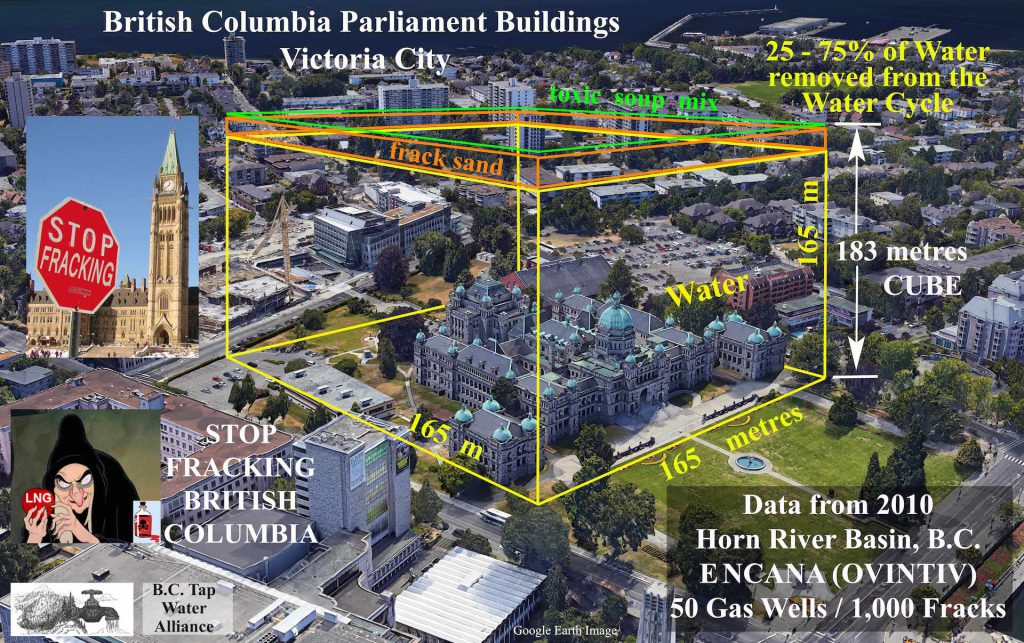
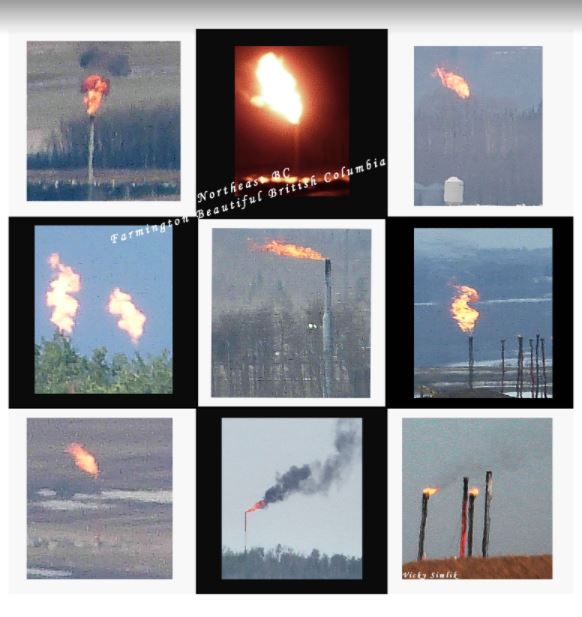
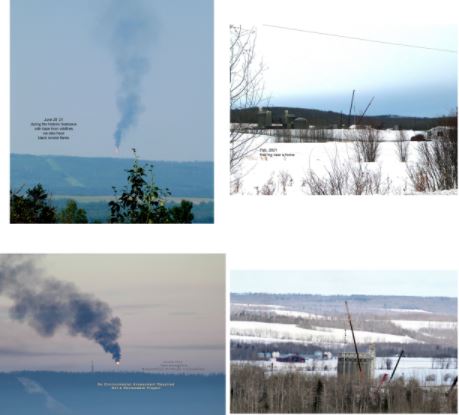
Encana/Ovintiv Frac’ing NEBC
2013: AER’s outside counsel, Glenn Solomon (white font) admits to an Albertan (orange font), that frac’ers replace water wells they damage with “a tank system forever” (a super shitty way to live) and money to shut the harmed up to keep poisoning others “down the street”:
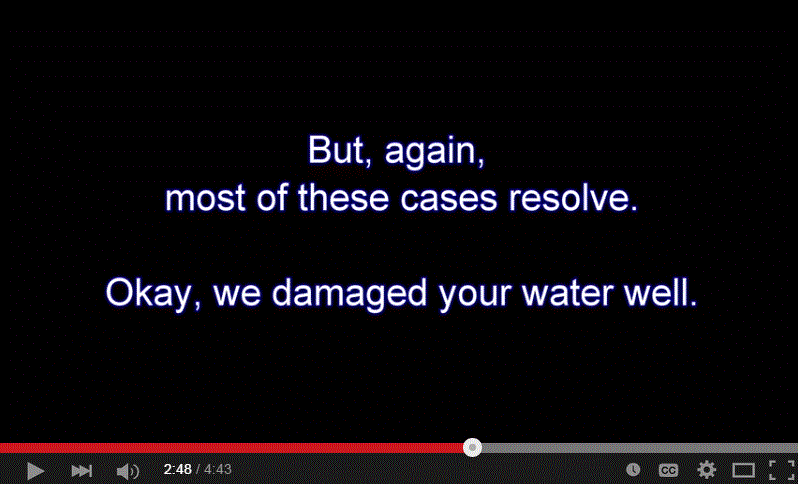
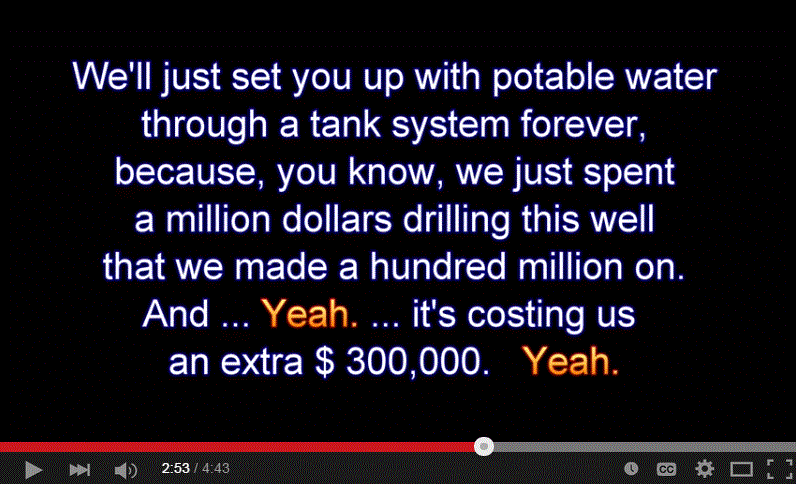
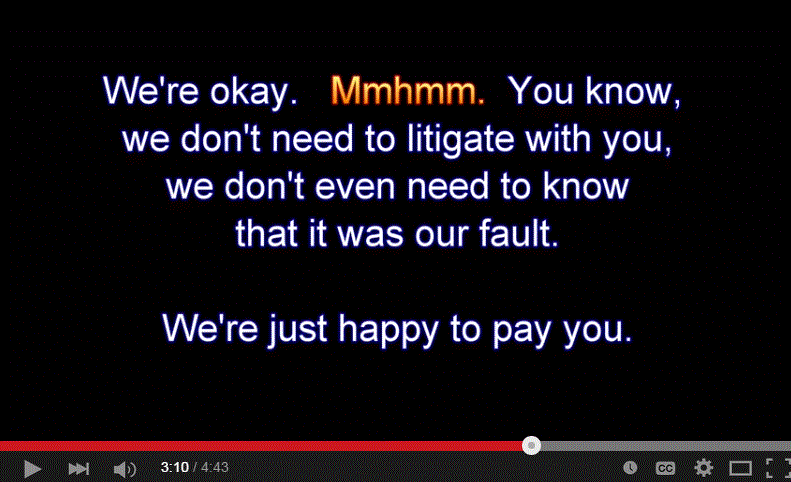
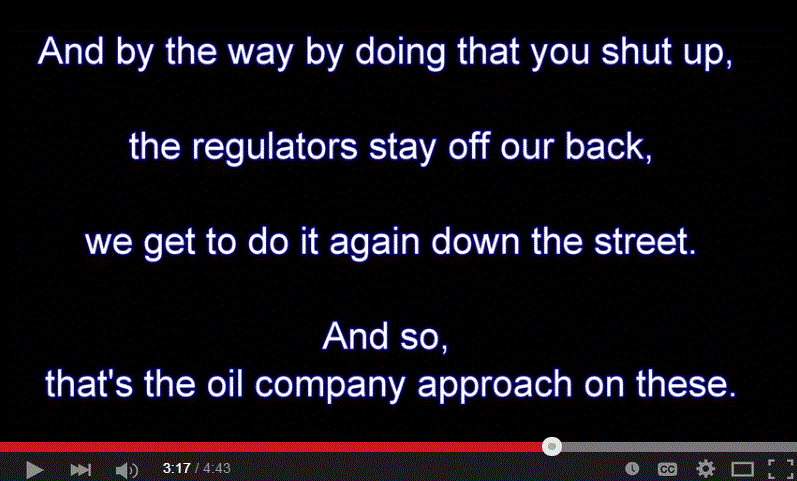
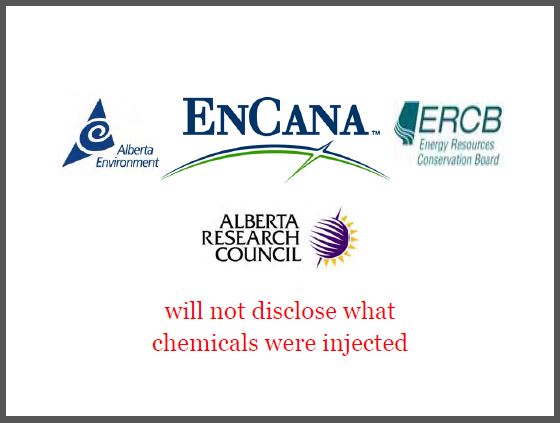
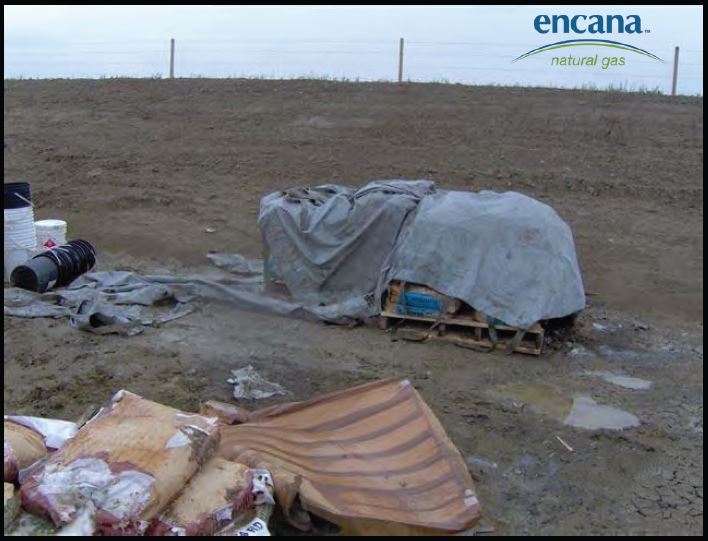
2006: Chemicals in the rain on a frac site near Rosebud Alberta. This is how Encana/Ovintiv treats the ground surface in communities where the company frac’s. Imagine how it treats the subsurface and our drinking water.
2004: Encana/Ovintiv illegally repeatedly frac’d Rosebud’s drinking water aquifers, contaminating them, with regulators (and politicians) bending over for the corporate criminal instead of regulating.
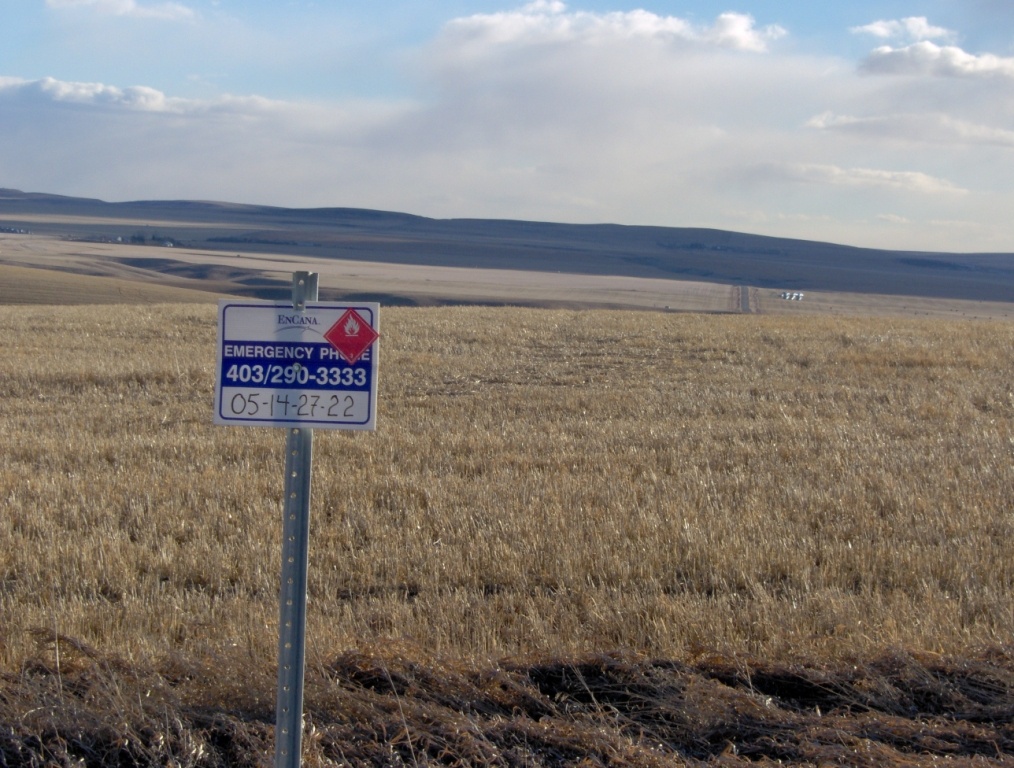
Encana/Ovintiv’s illegal gas well, 5-14-22-27-W4M, now covered up, aquifers still not repaired.
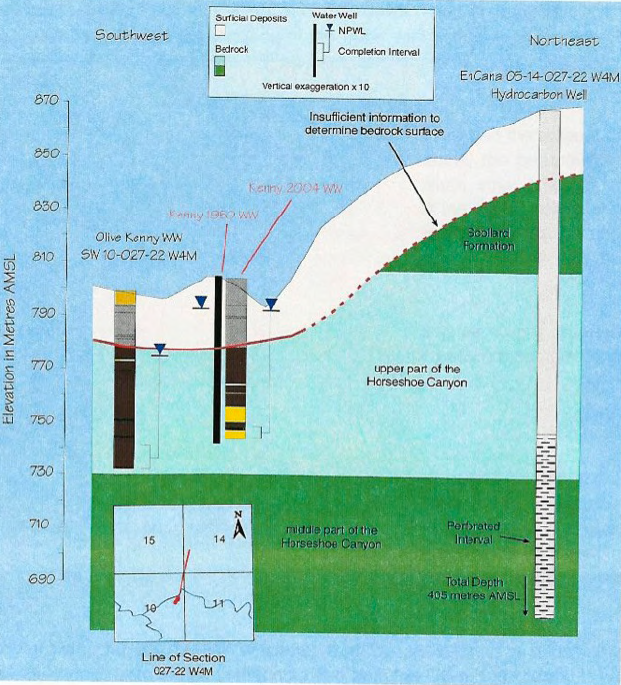
Schematic by HCL, consultants hired by Encana/Ovintiv after area water wells started going bad, showing the company’s illegal fracs. Report obtained by Ernst via FOIPs, filed for my go-nowhere-but-devour-my-savings lawsuit, and uploaded to this website. During the year Murray Klippenstein (Ernst’s lead lawyer, just another bullying liar) refused me my website (that I had paid for in full, including paying masses of money for his lawyer-in-training, Cory Wanless, that screwed up my website requiring me to redo his legal work) it was mysteriously removed, along with hundreds of other legal filings, and Encana/regulator data and documents Ernst uncovered over decades.
